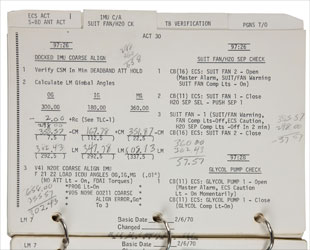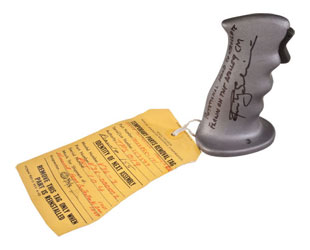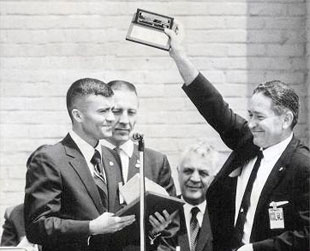January 9, 2012 — Apollo 13 commander Jim Lovell and a few of his fellow Apollo astronauts were in Washington, D.C. on Monday, where they met with NASA to address "misunderstandings" over the ownership of the mementos they kept from their missions.
Their meeting at NASA Headquarters with Administrator Charles Bolden, a former shuttle astronaut himself, came after the space agency questioned the $388,375 sale of one of Lovell's Apollo 13-flown checklists last December.
NASA's request for the proof of ownership for the 70-page, ring-bound book, along with other artifacts — including two pieces of equipment offered by Apollo 9 astronaut Rusty Schweickart — resulted in Dallas-based Heritage Auctions halting the transfer of the items to their winning bidders.
"These are American heroes, fellow astronauts, and personal friends who have acted in good faith," Bolden said of Lovell, Schweickart and the other astronauts who joined them at the meeting. "We have committed to work together to find the right policy and legal paths forward to address outstanding ownership questions."

A checklist used by Apollo 13 commander Jim Lovell which sold for $388,375 on Nov. 30, 2011, is now the focus of a fundamental misunderstanding between NASA and its former astronauts. (HA) |
NASA's inquiry and the resulting hold that it placed on the checklist's record-setting six-figure sale was first reported by collectSPACE.com last Tuesday (Jan. 3). The space agency's general counsel first informed the auction house of its concerns on Dec. 1, 2011, the day after the sale had been held.
Joining Lovell and Schweickart at Monday's meeting were moonwalkers Charlie Duke and Gene Cernan, as well as other former astronauts' representatives.
Fundamental misunderstandings
Although the former astronauts and Bolden did not reach a solution during the meeting, they recognized the need to work together to resolve this issue.
"We discussed how to resolve the misunderstandings and ownership questions regarding flight mementos and other artifacts," Bolden said in a statement released Monday. "I believe there have been fundamental misunderstandings and unclear policies regarding the items from the Mercury, Gemini, Apollo and Skylab programs."
"NASA appreciates the position of the astronauts, learning institutions, museums, and others who have these historic artifacts in personal and private collections," he said.

NASA has questioned astronaut Rusty Schweickart's title to this hand controller, which was given to him after Apollo 9. (HA) |
At potential issue are not just the four artifacts that NASA questioned from the November auction but all of the flight used equipment that the astronauts retained after their missions in the 1960s and 70s. In the decades since, the retired astronauts have donated some of their mementos to museums and sold others to private collectors.
Those donations and sales went largely unchallenged by NASA until recently. If NASA's independent investigative arm, the Office of Inspector General, were to decide that Lovell's and Schweickart's artifacts were still government property, it could raise concerns about all the artifacts that were previously transferred by the astronauts.
Bolden said that he recognized the need to clarify NASA's artifact policies as promptly as is possible.
"We [will] explore all policy, legislative and other legal means to resolve these questions expeditiously," he said, "and clarify the ownership of these mementos, and ensure that appropriate artifacts are preserved and available for display to the American people.," Bolden said.
Exploring the evidence
That this has become an issue now, four decades later, is due in part to the way in which mission-used equipment was given to the astronauts soon after their missions. In many cases, no formal title transfer was ever drafted as NASA's policies concerning the mission mementos were largely unwritten at the time.
Since the news broke last week about NASA's inquiry into the astronauts' auctioned items, collectSPACE.com, its readers and others have been searching for information that supports either the astronauts' or NASA's ownership of the artifacts.
An archived 1973 letter written by the director of NASA's Johnson Space Center in Houston to NASA Headquarters provides a list of 23 different categories of "expendable equipment" that were proposed as astronaut mementos. It specifically excludes checklists like the type auctioned by Lovell, but the letter was part of an on-going discussion and not meant as the agency's final policy.
To that end, astronauts from every Apollo mission have had possession of flight-used checklists and many have sold or donated the documents over the past two decades without NASA's objection.
Among the other challenged items is a commemorative identification plate flown aboard the Apollo 9 lunar module. According to the astronauts, the ID plates were purposely flown to be presented to them after the mission by the spacecraft's manufacturer.
A photo of a ceremony held in 1970 for the Apollo 13 crew appears to support this by showing a similar plate to the one auctioned by Schweickart mounted to a plaque being presented to the astronauts.

An Apollo lunar module ID plate similar to the one sold by Apollo 9 astronaut Rusty Schweickart is seen here being presented to the Apollo 13 crew in 1970. (Retro Space Images) |
The other of Schweickart's items questioned by NASA, a joystick-like hand controller from the Apollo 9 command module, appears listed on a NASA form documenting the disposition of the capsule's equipment. The ASHUR, or Apollo Spacecraft Hardware Utilization Request states the controllers were being released to the crew.
The fourth artifact that NASA questioned, a training glove used by the late astronaut Alan Shepard, was consigned by a third party, not an astronaut, and therefore falls under a different chain of ownership.
